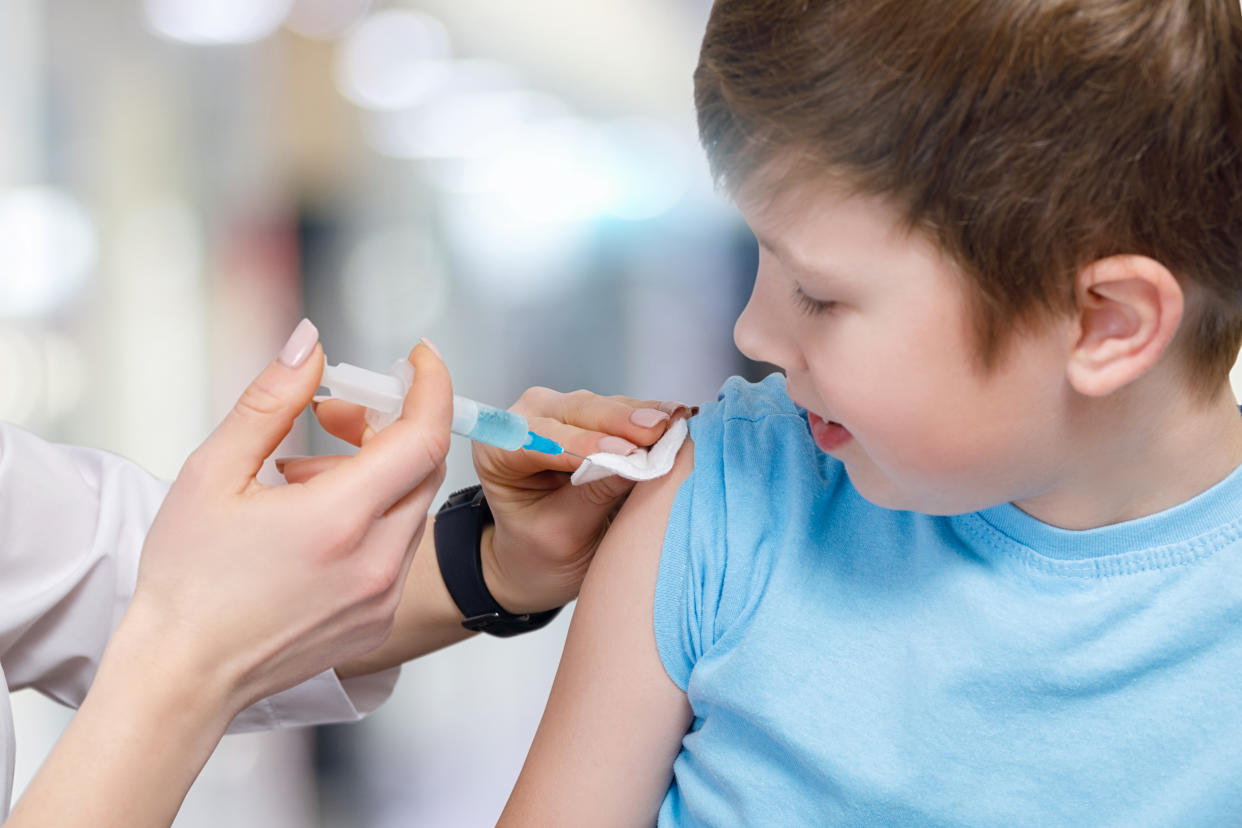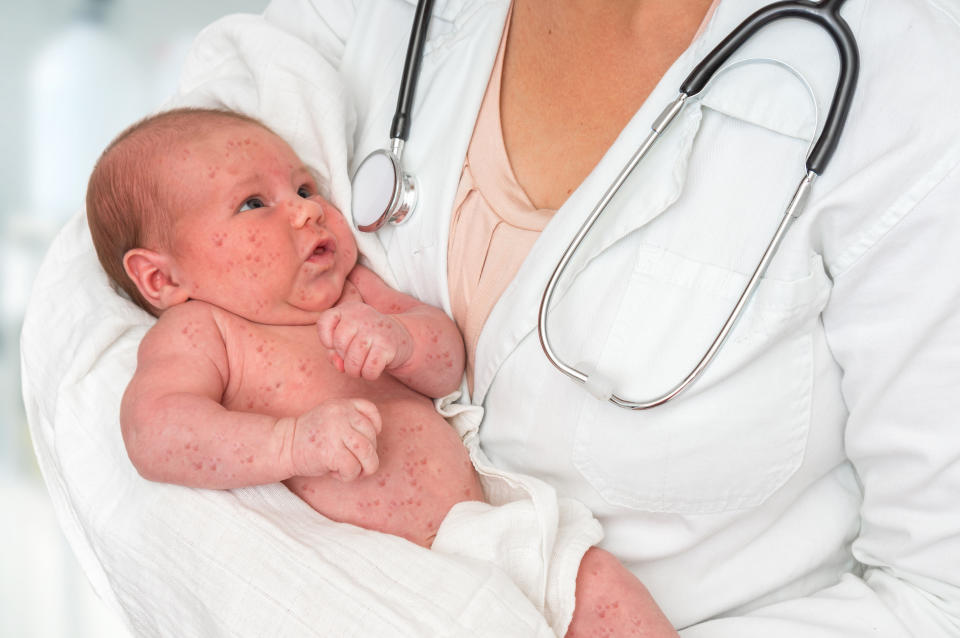Should we be concerned less children are having vaccines?

One in seven children have not had both doses of the measles, mumps and rubella (MMR) vaccine by the time they turn five, Public Health England (PHE) data shows.
With just 86.4% of English people having the second jab, rates are falling far below the 95% required for “herd immunity”.
Herd immunity protects people unable to have the MMR jab, like newborns and those on chemotherapy, from the infections. While rarely serious, measles can be life-threatening in up to three in every 1,000 cases, statistics show.
A fall in vaccination rates among primary school children has left an expert concerned for the “most vulnerable” in society.
A professor from Queen Mary University worries too few youngsters are getting the MMR jab to protect those unable to get immunised.

“It is very concerning that vaccination rates for five years olds are so low and specifically that MMR coverage is well below the level needed to be sure of herd immunity,” Professor Jonathan Kennedy, senior lecturer in global public health at Queen Mary University of London, told Yahoo UK.
“Vaccines benefit individual children because they prevent them from contracting dangerous and sometimes deadly infectious diseases such a measles.
“But vaccines also benefit the whole community because when coverage reaches a certain rate outbreaks no longer occur.
“‘Herd immunity’ is important as it protects some of the most vulnerable people is society who cannot be vaccinated, for example, because they are too young or because their immune system is compromised by chemotherapy.”
READ MORE: 'Dramatic resurgence' of measles seen in Europe, WHO reports
In a report released today, the National Audit Office (NAO) found NHS England has missed the pre-school vaccination targets set by the Department of Health and Social Care.
Healthy children in the UK are offered a nasal spray flu vaccine at two and three years old.
At three years and four months, they are given an MMR booster, as well as an extra jab against diptheria, polio, whooping cough and tetanus.
The youngsters are first given an MMR vaccine at one-year-old and are immunised against the other conditions at eight weeks.
READ MORE: Can a business owner require staffers to get vaccinated?
Uptake of all of these boosters has been on the decline since 2012, according to the NAO. Earlier this year, the World Health Organization withdrew the UK’s “measles elimination status”. This is only awarded when there have been no cases brought in from overseas for a year.
PHE estimates around 90,000 children in England have not had the second MMR dose, putting them at risk of the nasty infections.
“With the news pre-school vaccination rates are falling, along with the UK recently being stripped of its measles free status, it’s clear a measles outbreak is now a ticking time bomb,” Liam Sollis, head of policy at Unicef UK, said.
As of last year, toddlers in France who have not had the necessary jabs, including the MMR, are not allowed to attend state schools or nurseries.
There are similar laws in many US states, with 50 of them requiring children have the MMR before they go to kindergarten.
In the UK, however, vaccination is the choice of the parents.
How dangerous is measles?
Up to one in 10 of those who only have the initial MMR vaccine as a baby are still at risk of measles, mumps and rubella, according to the NHS. This rises to less than one in 100 after the second dose.
While numerous studies have proven the MMR is safe, some children are unable to receive it. This includes those on immunosuppressive drugs after an organ transplant. People with a weak immune system or on steroid tablets may also have to give it a miss.
These youngsters therefore rely on herd immunity. This means that if a child catches measles but is surrounded by others at school who have had the MMR, the infection cannot take hold.
Vaccination rates below the 95% “threshold” leave non-immunised youngsters at risk. Measles, which is particularly contagious, usually just causes a tell-tale rash, as well as fever, red eyes, cough, and aches and pains.
However, as many as one in every 20 children with measles get pneumonia, the most common cause of death from the infection among youngsters, according to the Centers for Disease Control and Prevention.
READ MORE: Half a million children missed measles vaccine - what are the signs, symptoms and complications?
One in 1,000 develop encephalitis, swelling on the brain. This can lead to convulsions that may then cause deafness or intellectual disability.
And up to three in 1,000 youngsters with measles die from respiratory or neurological complications.
Infection during pregnancy can also lead to premature labour, miscarriage or stillbirth.
Last year alone, 989 laboratory-confirmed cases occurred throughout England, PHE data shows.
The rise in anti-vaxx is a “complex phenomenon”, Professor Kennedy told Yahoo UK.
A PHE survey earlier this year suggested 95% of parents are “confident” when it comes to the safety of vaccinations, with just 3% refusing for their child be immunised.
A study by the Wellcome Institute, however, found just 59% of those in western Europe believe jabs are safe.
This may stem from discredited “research” by former gastroenterologist Andrew Wakefield “linking” the MMR to autism. Wakefield has since been struck off after the theory was disproven, however, concerns still linger.
There is also evidence the reorganisation of the health system in England in 2013 resulted in the vaccination programme being delivered in a fragmented way, the report states.
The way healthcare professionals remind parents to vaccinate their child is also inconsistent, it adds.
Parents are contacted to book an appointment by being called and recalled by healthcare professionals. When primary care trusts were abolished in 2013, NHS England took responsibility for the calls, however, the role of GPs in this process is muddled. This has led to inconsistencies in how the system works in different parts of the country.
Some parents claim it is difficult to access vaccination services due to the timing and availability of appointments. There are also “under-served” communities when it comes to healthcare, such as travellers, which may also affect vaccination rates.
“Practices are striving to reach everyone who can be vaccinated using every opportunity to encourage uptake of vaccinations,” Dr Richard Vautrey, GP committee chair at the British Medical Association, said.
“However, we need resources for improved information systems, particularly regional databases, so that records and vaccination figures are always accurate.”
“Furthermore, reorganisation and cuts to services delivered outside of practices, including public health, health visitors and school nurses, mean there are fewer opportunities for both positive discussions around the importance of vaccines and to identify any children who may have missed out earlier.”
Mr Sollis added: “The key to increasing vaccination rates in the UK is building trust with parents and improving access to vaccine services.
“Healthcare professionals need training to answer difficult questions about vaccines with confidence and compassion, while GPs need support to improve appointment and reminder systems and offer extended vaccine services.”


